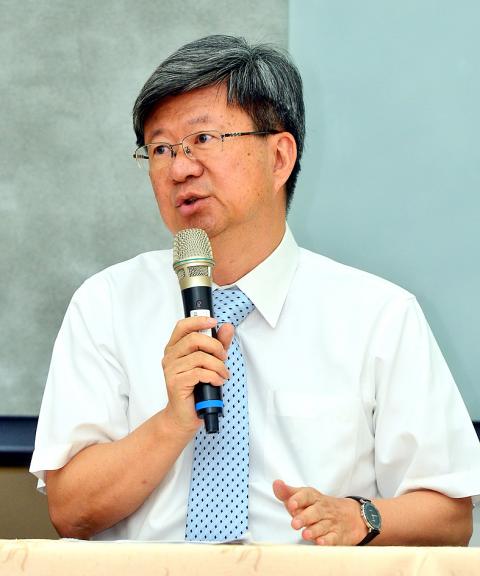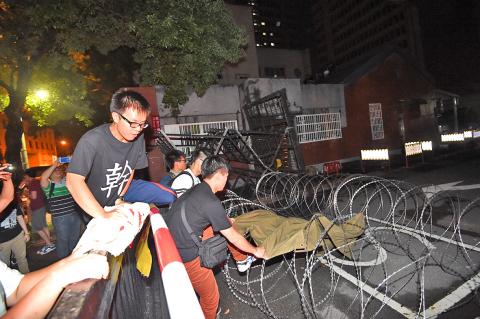Students who allegedly broke into the Ministry of Education (MOE) compound late on Thursday night — and possibly three journalists who followed the students — are to be charged with several offenses, Minister of Education Wu Se-hwa (吳思華) said yesterday, calling the students a “front” for external political forces.
Wu said that the ministry had communicated with students on numerous occasions, both official and unofficial, and had shown restraint in not prosecuting previous incidents of trespassing on ministry property.
“Our tolerance has been rewarded with continued irrational behavior, which we feel has been disorderly and seriously breaches the bounds of what is acceptable, creating the worst possible example,” Wu said, adding that he wished to express his “regret” and “condemnation” of the students’ “brashly illegal behavior.”

Photo: Taipei Times
The ministry said that 33 people had been arrested, including 24 students, three reporters and six other individuals. Eleven minors were among those arrested.
The students used ladders to scale barbed-wire barricades on the perimeter of the ministry compound, with a number of students later barricading themselves inside Wu’s office.
MOE Secretary-General Wang Chun-chuan (王俊傑) said that the students would be prosecuted for two charges according to the Criminal Code: trespassing on the dwelling or structure of another and damaging public property.

Photo: Liao Chen-huei, Taipei Times
Wu condemned what he called the “unethical behavior” of outside political forces behind the student movement.
“At many venues, we found that some political parties and social organizations have interposed themselves in activities relating to the curriculum guidelines,” Wu said. “They hide themselves behind students who are pushed to the front lines.”
Wu also ruled out any temporary suspension of the controversial curriculum guidelines, stating that the administrative procedures for them to go into effect next month have already been completed and he could not reverse them.
He said the ministry maintains that schools are to be allowed to use textbooks based on either the old or new versions of guidelines, with teachers using “supplementary materials” to lead discussion on both sides of the controversial portions.
Regarding communication with students, Wu said that students protesting earlier this week had failed to clearly state how they wished to communicate with ministry officials.
While schedule conflicts prevented him from attending Thursday’s ministry-sponsored forums on the guidelines, the officials who did attend were fully capable of representing the ministry’s position, he said.
Forums were delayed for more than a month after the first event ended with Wu being confronted by students, who attempted to prevent him from leaving.
Wu said he remained willing to meet with student representatives, with the time, place and manner of such a meeting all negotiable.
He confirmed that Wu Ching-shan (吳清山) had tendered his resignation as director of the K-12 Education Administration, which is responsible for implementing the guidelines, but said that he had yet to approve the request.

NATIONAL SECURITY THREAT: An official said that Guan Guan’s comments had gone beyond the threshold of free speech, as she advocated for the destruction of the ROC China-born media influencer Guan Guan’s (關關) residency permit has been revoked for repeatedly posting pro-China content that threatens national security, the National Immigration Agency said yesterday. Guan Guan has said many controversial things in her videos posted to Douyin (抖音), including “the red flag will soon be painted all over Taiwan” and “Taiwan is an inseparable part of China,” while expressing hope for expedited “reunification.” The agency received multiple reports alleging that Guan Guan had advocated for armed reunification last year. After investigating, the agency last month issued a notice requiring her to appear and account for her actions. Guan Guan appeared as required,

Japan and the Philippines yesterday signed a defense pact that would allow the tax-free provision of ammunition, fuel, food and other necessities when their forces stage joint training to boost deterrence against China’s growing aggression in the region and to bolster their preparation for natural disasters. Japan has faced increasing political, trade and security tensions with China, which was angered by Japanese Prime Minister Sanae Takaichi’s remark that a Chinese attack on Taiwan would be a survival-threatening situation for Japan, triggering a military response. Japan and the Philippines have also had separate territorial conflicts with Beijing in the East and South China

A strong cold air mass is expected to arrive tonight, bringing a change in weather and a drop in temperature, the Central Weather Administration (CWA) said. The coldest time would be early on Thursday morning, with temperatures in some areas dipping as low as 8°C, it said. Daytime highs yesterday were 22°C to 24°C in northern and eastern Taiwan, and about 25°C to 28°C in the central and southern regions, it said. However, nighttime lows would dip to about 15°C to 16°C in central and northern Taiwan as well as the northeast, and 17°C to 19°C elsewhere, it said. Tropical Storm Nokaen, currently

PAPERS, PLEASE: The gang exploited the high value of the passports, selling them at inflated prices to Chinese buyers, who would treat them as ‘invisibility cloaks’ The Yilan District Court has handed four members of a syndicate prison terms ranging from one year and two months to two years and two months for their involvement in a scheme to purchase Taiwanese passports and resell them abroad at a massive markup. A Chinese human smuggling syndicate purchased Taiwanese passports through local criminal networks, exploiting the passports’ visa-free travel privileges to turn a profit of more than 20 times the original price, the court said. Such criminal organizations enable people to impersonate Taiwanese when entering and exiting Taiwan and other countries, undermining social order and the credibility of the nation’s